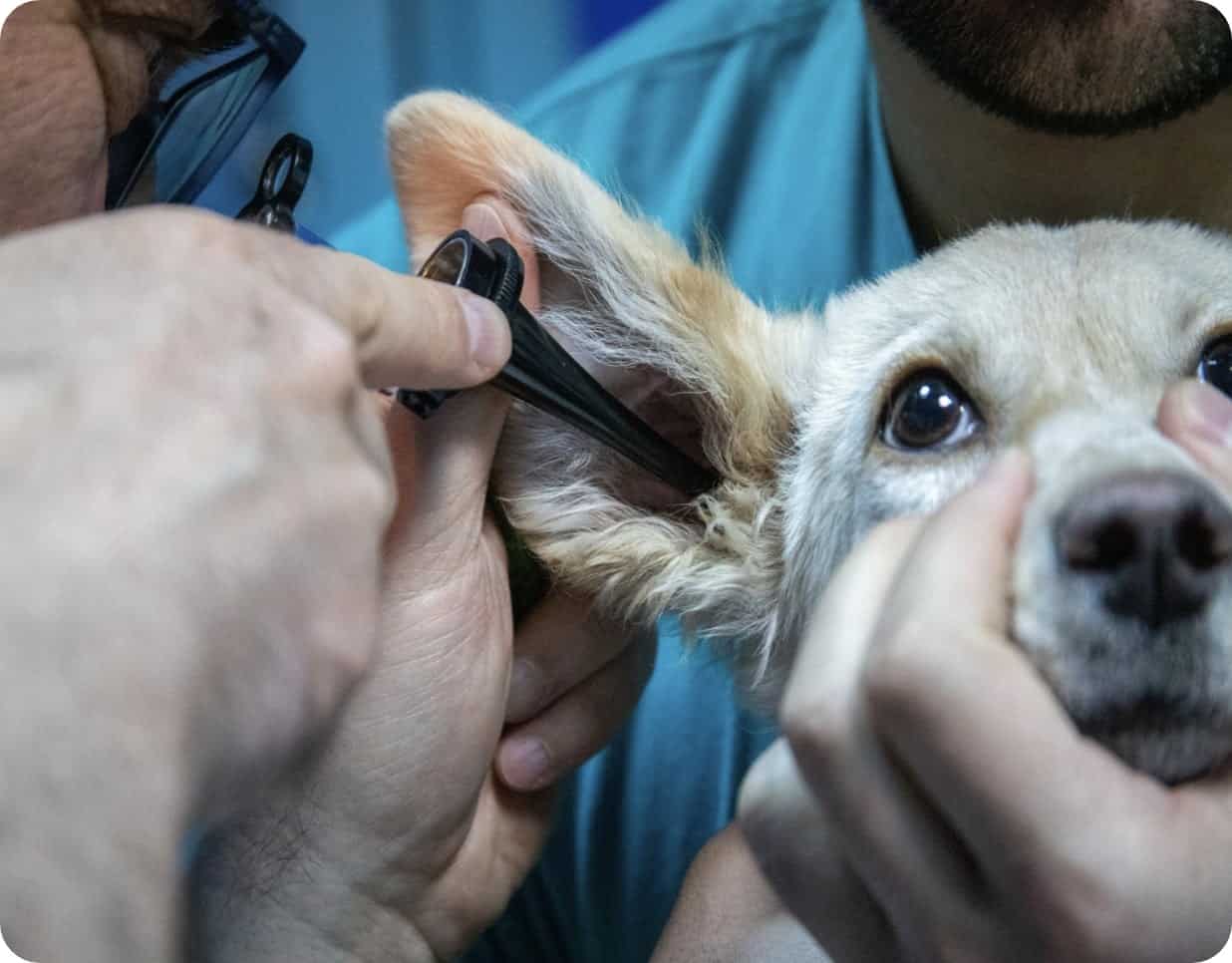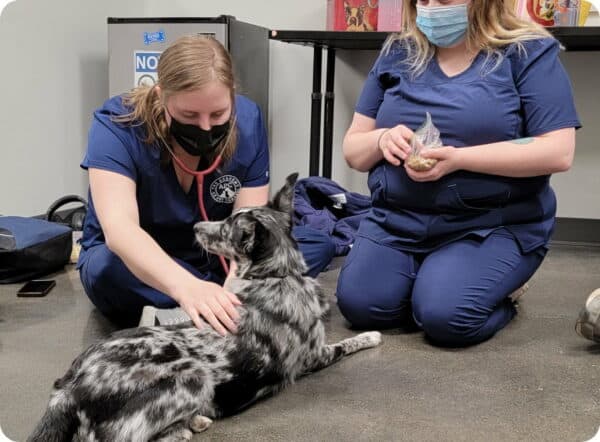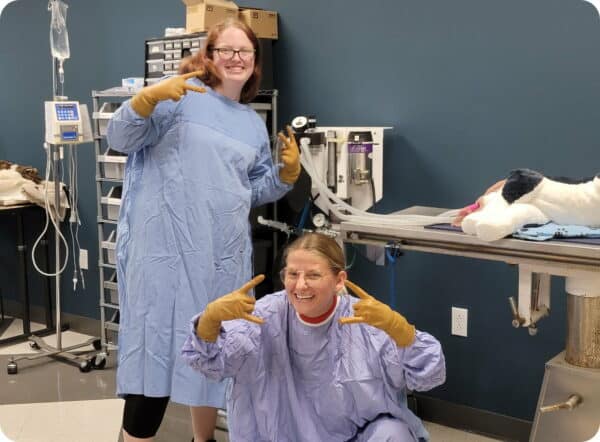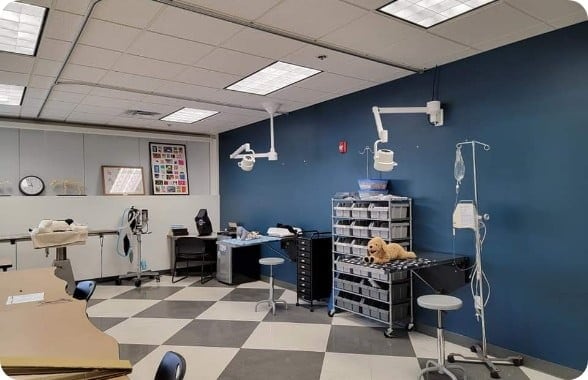Launch your career in veterinary care
with our vet assistant school and certification program. Become a Vet Assistant in 5 months
Our comprehensive vet assistant program offers top-notch vet assistant training without the time commitment of other tech or vet assistant schools.
Receive a comprehensive education without the cost of a lengthy vet tech program
Start practicing right away — you don’t need a state license
Get a certification and hands-on training in methods that aren't found in most vet assisting programs
Attend in-person training classes (limited to 15 students) at our campus in St. Charles, MO
Learn how to launch your career as a vet assistant in just
100 days
Receive a program guide and a free 10-minute call with our admissions team.
*By submitting you opt-in to receive SMS/MMS messages from the APC.



Hands-on veterinary assistant
school in Missouri
The Veterinary Assistant School at The Academy of Pet Careers can get you started in a new career in just a few months. The veterinary industry is looking for trained veterinary assistants, and a formal vet assistant program is the quickest way to achieve your goals.
All of our training programs focus on the well-being of the pet and follow our Pet Empowerment practices. As a result, our graduates will be trained in methods that aren't found in most vet assisting training programs.
Proud to be a part of this school!
This school is amazing. I went through the Vet Assistant program and loved every second of class! Sure there is some textbook stuff, but every minute was fascinating! You also learn a lot more skills so you stand out to employers. My teacher is amazing and cares so much! In fact the whole school cares so much! It’s not like a university where it’s extremely hard and they just want your money. These people really care about their students and the animals. I’m proud to be a part of this school and represent this school throughout my career. Love you guys!
Why hundreds of students have trusted The Academy of
Pet Careers with their veterinary assistant training

Hands-on learning
This program combines both hands-on and lecture-based education, ensuring you can jump right into your new career from Day 1.

Small class sizes
You get one-on-one attention from instructors for optimal learning and hands-on training.

Modern & optimized curriculum
We constantly update and revise our curriculum in accordance with the trends and demands in the pet industry.

Financial aid
We are approved by many funding organizations to help with school expenses. Our admissions team helps you through the application process.

Dual certifications
We offer dual certification opportunities for you to study multiple trades, giving you added job stability and increased income potential.

You are set up for success
Our vet assistant programs are designed to set the students up for success - we focus on training skills you need to excel in your desired career.
Job assistance
We do more than just vet assistant training. We help with the job search and connect you with businesses needing vet assistants.

Job ready in 5 months
This program is designed to move fast and give you valuable hands-on training. Once complete, you’re ready to immediately use your new skills in the industry.


100% Money-back guarantee
Our money back guarantee is also known as our “drop window”. It is a 14 calendar-day period at the beginning of their program, that allows students to be sure that they have picked out the perfect program for them.
We are so sure that you will be happy with your schooling that we offer a “Money Back Guarantee” to ensure your satisfaction. If for any reason you wish to discontinue your attendance at The Academy of Pet Careers, a refund will be issued with no questions asked.

How vet assistants differ from vet techs
Even though vet assistants and vet techs perform much of the same tasks, there are key differences
in how they receive their education, what they do and how much they make. Review the breakdown
below to learn more and make an informed decision about your future career.
I highly recommend this place to anyone
who loves animals. I did the vet assistant program,
grooming program and PEP. It really
helped me to get my foot in the door. I’m now
a technician and work at an amazing hospital.
I love this place!

Rachel Stoddart
I had so much fun and learned so much during my time in the Veterinary Assistant class! Everything was very engaging and Katie(teacher) made the class so much fun.

Keith Faulkner
When I graduated I couldn’t have done it without my amazing teachers! they were great! they helped so much in something I didnt understand or didn’t get. if it wasnt for all the positive things they do I wouldn’t
be here!

Jordan Van Lue
Pet companies that hire our students






Our program gives you the skills and industry
experience to excel in a career as a veterinary assistant
Veterinary Assisting Program

Introduction to Veterinary Assisting
Maintaining a Clean & Safe Environment
Common Veterinary Medical Conditions
Small Animal Identification & Communication
Handling & Restraint of Canines & Felines
Small Animal Husbandry and Nutrition
Laboratory Procedures
Pharmacology and Medical Care
Diagnostic Imaging
Surgical Assisting
Exotics
Large Animals
Being a Valuable Team Member
Career Preparation
Pet CPR & First Aid
I highly recommend studying professional
training at the Academy of Pet Careers! It is a lot of hands-on which is very helpful. The teachers and staff are so amazing and you can almost pretty much make your own schedule. You can go to school and still have a job and the staff is very understanding about your goals.

Katarina Ziegler
Veterinary Assisting Program

Introduction to Veterinary Assisting
Maintaining a Clean & Safe Environment
Common Veterinary Medical Conditions
Small Animal Identification & Communication
Handling & Restraint of Canines & Felines
Small Animal Husbandry and Nutrition
Laboratory Procedures
Pharmacology and Medical Care
Diagnostic Imaging
Surgical Assisting
Exotics
Large Animals
Being a Valuable Team Member
Career Preparation
Pet CPR & First Aid
I highly recommend studying professional
training at the Academy of Pet Careers! It is a lot of hands-on which is very helpful. The teachers and staff are so amazing and you can almost pretty much make your own schedule. You can go to school and still have a job and the staff is very understanding about
your goals.

Katarina Ziegler

The advantages you gain with in-person vet assistant training
Hands-on courses are more personalized and comprehensive offering maximum value for your time.
Live courses can be customized to your learning style. Everybody learns at their own pace and we make sure no one is left behind.
You learn from experienced professionals in the industry who know how to teach and help you succeed.
They are more fun! You learn in a positive and friendly environment that consists of dog lovers such as yourself.
What makes the Academy of Pet Careers such a unique place to learn vet assisting?
We offer dual certification opportunities for you to study multiple trades: dog training, pet grooming, and vet assisting. This offers added job stability and increased income potential.
Our vet assistant training is designed to set the students up for success - we focus on teaching you the skills you need to excel in your desired career.
Our veterinary assistant certification is unique in that it provides the most comprehensive and pertinent information to start your new career.
You benefit from 30 years of experience in the pet field from our instructors who know what it takes to succeed in this career path.

Frequently Asked Questions
A veterinary assisting school is an educational institution that offers structured in-person or online training programs to teach you how to become a vet assistants. Attending one can provide you with the knowledge, skills, and vet assistant training needed to pursue a career in a vet clinic.
Most vet assisting programs have minimal prerequisites, such as a high school diploma or equivalent. To attend a training program at the APC, you must be 18 years of age for all in-person classes. No other experience is necessary.
The duration of vet assistant training schools can vary. Most schools will have programs ranging from 12-weeks to 6 months, with a few exceptions. Length can be an important deciding factor, but shorter programs will not provide the same level of proficiency as longer ones. At the APC, our vet assisting program takes less than 6 months to complete.
Vet assistants can work in various settings, including veterinary clinics, animal shelters, zoos, or anywhere else animals health is a concern. The demand for qualified vet assistants is generally high and the skills required translate well into any animal career.
While a vet assisting certification is not required, it can significantly enhance your credibility and job prospects. Many clinics prefer to work with educated and trained vet assistants.
There are currently no licensing requirements for vet assistants in Missouri. Most states in the US have no requirement to work as a vet assistant but some states may require a vet assistant certification to practice.
Unlike most 2-4 year educations required to become a veterinary technician, vet assisting programs are a fraction of the price and length. You should expect to spend anywhere between $10,000 and $20,000 for an in-person program.
In-person training programs provide practical experience working with dogs in real-life situations, while online programs offer flexibility and self-paced learning. The choice depends on your learning style, goals, funds for education, and availability.
As a graduate of The Academy of Pet Careers, you will earn a nationally recognized certification that proves that you met the high standard of proficiency set forth by the APC. Graduates will receive a badge and letters to represent your accomplishments and make you more marketable to clinics in all states.
Average Vet Tech Salary in 2024: How Much Do Vet Techs Make?
In the world of animal healthcare, veterinary technicians (vet techs) play a crucial role in ensuring the well-being of our furry companions. If you’re considering a career in this field or are simply curious about vet tech salaries, you’ve come to the right place. Let’s delve into the details of vet tech compensation, exploring average…
Read MoreAverage Veterinarian Salary in 2024: How Much Can Veterinarians Make
Embarking on a journey into veterinary medicine? Let’s explore the average veterinarian salary, a figure that reflects not just years of dedication and study, but also the profound impact of these professionals on animal health and welfare. In this comprehensive exploration, we will uncover the myriad factors that influence veterinarian incomes, from educational investments…
Read MoreHow to Become a Veterinarian: Your Path to Success
Embarking on the journey to become a veterinarian opens a world of possibilities for those passionate about animal health. This rewarding career not only demands a strong commitment but also a love for animals that fuels the rigorous path ahead. Understanding the Veterinary Profession Veterinarians play a crucial role in animal healthcare, offering not only…
Read More



















